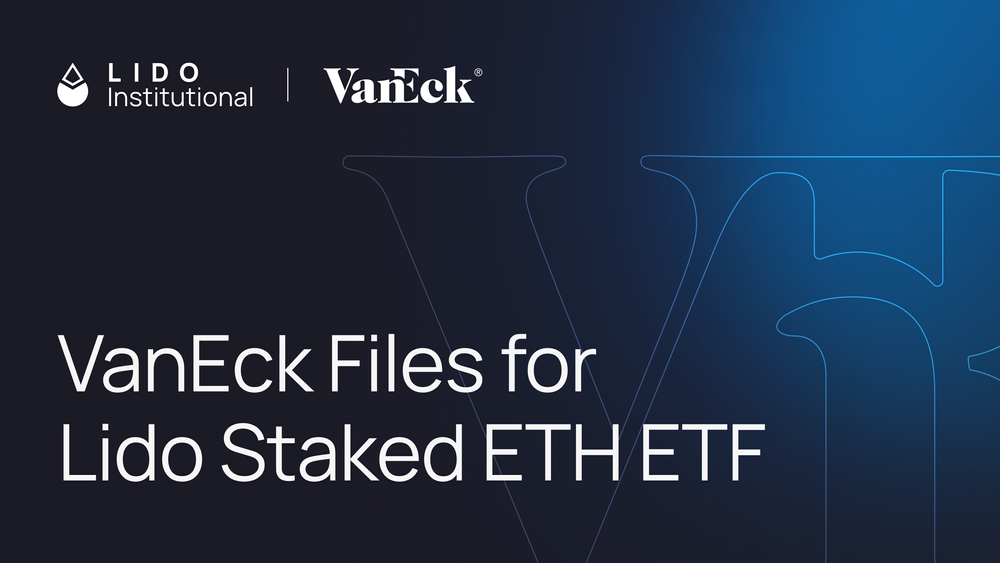VanEck Files for Lido Staked ETH ETF

VanEck has filed an S-1 registration statement with the U.S. Securities and Exchange Commission (SEC) for the ‘VanEck Lido Staked ETH ETF’, a proposed fund designed to provide investors with exposure to stETH, ETH staked via the Lido protocol.
“The filing signals growing recognition that liquid staking is an essential part of Ethereum’s infrastructure. Lido protocol’s stETH has shown that decentralization and institutional standards can coexist, providing a foundation the broader market can build on,” said Kean Gilbert, Head of Institutional Relations at Lido Ecosystem Foundation.
The ETF would hold stETH, benefiting from its extensively audited smart contracts, deep secondary-market liquidity, and integrations with leading custodians and exchanges. Since launch, staking users have earned more than $2 billion in staking rewards through the Lido protocol, which today has a total value locked of nearly $40 billion.
If approved, the ETF would give institutional investors a compliant, tax-efficient way to gain Ethereum staking exposure within a regulated investment structure.
ETF Overview
The ETF closely mirrors Ethereum’s staking economics while maintaining daily liquidity and transparent onchain backing. For ETF issuers, liquid staking eliminates the need to hold idle ETH for redemptions. Because stETH can be redeemed or traded without Ethereum withdrawal delays, issuers can manage creations and redemptions more efficiently while maintaining continuous exposure to Ethereum’s staking economy.
The VanEck filing represents the first U.S. ETF proposal referencing stETH, bringing this form of onchain exposure closer to mainstream portfolios.
Regulatory & Policy Context
Recently, the SEC’s Division of Corporation Finance clarified that standard liquid staking activities — including issuance, redemption, and secondary trading of staking receipt tokens — do not constitute securities transactions when conducted within administrative and ministerial parameters. This guidance has also provided a clearer foundation for regulated products referencing liquid staking tokens like stETH by confirming that staking receipt tokens, though evidencing ownership of deposited assets, are not securities because the underlying assets themselves are not securities.
Alongside this, contributors to the Lido Labs Foundation have been active in industry and policy discussions around liquid staking. Through participation in trade associations such as the Crypto Council for Innovation (CCI), CCI’s Proof of Stake Alliance, and the Blockchain Association, the Lido Labs Foundation has worked to educate both policymakers and industry participants on the technology and its implications. This includes research and engagement supporting recent regulatory clarity around liquid staking frameworks.
“Filings that reference liquid staking are a sign of growing regulatory understanding. Through our work across the Crypto Council for Innovation (CCI), CCI’s Proof of Stake Alliance, Blockchain Association and other industry groups, we’ve aimed to help shape that conversation constructively and ensure decentralized protocols like Lido’s can support compliant, transparent access to Ethereum staking,” said Sam Kim, Chief Legal Officer, Lido Labs Foundation
Implications for Institutional Access
The filing highlights the growing alignment between decentralized infrastructure and traditional financial products. For ETF issuers and custodians, this filing demonstrates how liquid staking, and in particular stETH, can fit within existing regulated structures.
This development underscores the steady integration of onchain technologies into mainstream investment frameworks, with stETH providing one of the most established examples of that bridge.
About Lido Institutional
Lido Institutional represents a dedicated group of contributors focused on advocating for the use of Lido’s open-source, liquid staking middleware by non-retail users. Lido's middleware provides a way to participate in the blockchain network validation process and get staking rewards for this activity. With a mission to democratize staking, Lido middleware lets users connect with node operators and stake their digital assets without the need to individually maintain hardware. For more information, please visit lido.fi/institutional.
- Follow Lido on X: x.com/LidoFinance
- Follow Lido on LinkedIn: linkedin.com/company/lidofi
About VanEck
VanEck has a history of looking beyond the financial markets to identify trends that are likely to create impactful investment opportunities. VanEck were one of the first U.S. asset managers to offer investors access to international markets. This set the tone for the firm's drive to identify asset classes and trends – including gold investing in 1968, emerging markets in 1993, and exchange traded funds in 2006 – that subsequently shaped the investment management industry. Today, VanEck offers active and passive strategies with compelling exposures supported by well-designed investment processes. As of April 30, 2025, VanEck managed approximately $116.6 billion in assets, including mutual funds, ETFs and institutional accounts. The firm's capabilities range from core investment opportunities to more specialized exposures to enhance portfolio diversification. Their actively managed strategies are fueled by in-depth, bottom-up research and security selection from portfolio managers with direct experience in the sectors and regions in which they invest. Investability, liquidity, diversity, and transparency are key to the experienced decision-making around market and index selection underlying VanEck's passive strategies. Since their founding in 1955, putting our clients' interests first, in all market environments, has been at the heart of the firm's mission.
For more information, please visit www.vaneck.com.